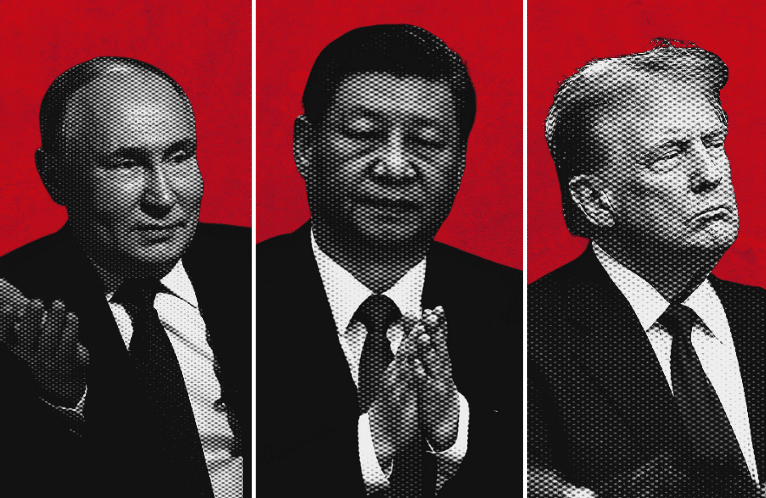A Bridge Too Far: Unscrambling ‘Ron Vara’
(Image: Ron Sachs – Pool via CNP/Sipa US/Newscom )
By Michael B. Cerny
If U.S.-China relations are analogized to building a bridge across the Pacific, a government official falsifying sources or information in academic publications, even if in jest, is like a civil engineer using erroneous math as a practical joke. Failing to correct these errors threatens the stability of the entire project, with potentially catastrophic results.
In a contemporary media environment increasingly characterized by the spread of disinformation, a degree of skepticism is imperative to parse through facts and ascertain truth and intention. Journalists, scholars, and former government officials have spilled much ink on the danger that disinformation presents to democracy, and, as certain states continue to employ disinformation as a tool to destabilize their adversaries, its foreign political dimensions are unmistakable.
As a subset of the broader phenomenon of “Fake News,” disinformation is only a part of the current problems plaguing political discourse. Perhaps equal in its detriment but distinct in its target, the cartoonishly negative views of certain United States’ officials in their publications produces another type of misinformation that can influence the stability of international relations. Revelations that Peter Navarro, a top advisor to the Trump administration, conjured up a fictitious economist in his academic publications to make distasteful remarks about China is one recent example.
Unlike disinformation, however, the target of these misinformation problems is not America itself, but the other countries with whom America shares its bilateral relationships, such as the People’s Republic of China.
‘Ron Vara:’ A 21st Century Pasquinade
Harvard University professor and librarian emeritus Robert Darnton wrote an intriguing article in 2017 that examined the history of misinformation. Noting examples of “Fake News” dating to as far back as the sixth century AD, Darnton recounts the story of Pietro Aretino, a 16th century author who attempted to manipulate a pontifical election by writing fictitious sonnets to slander candidates. Darnton traced the subsequent history of these so-called “pasquinades,” which later developed “into a common genre of diffusing nasty news, most of it fake,” and their surprising significance during events such as the French Revolution. Regarding misinformation, a strong parallel can be drawn between Peter Navarro’s fictious economist “Ron Vara,” and Aretino’s pasquinades.
Navarro, an economist and former business professor at the University of California, Irvine, currently serves under the Trump Administration as the Assistant to the President and Director of Trade and Manufacturing Policy. He has long fashioned himself as a China expert. In reality, Navarro advocates dubious and uber-hawkish views on China that rest far outside the (already hawkish) mainstream of Washington policy circles.
In a rather damning assessment of Navarro’s professional reputation when it comes to China, his colleagues at the University of California stated to Foreign Policy that “he generally avoided people who actually knew something about the country.” A former chairman of the American Chamber of Commerce in China also did not mince words when it came to describing Navarro’s publications, which include titles such as Death by China and The Coming China Wars, stating that these “have close to zero credibility with people who know the country” and are filled with “hyperbole [and] inaccuracies.”
Demonstrating Navarro’s pernicious effect on U.S.-China relations in the current climate of misinformation, it was reported by The Chronicle of Higher Education last week that Tessa Morris-Suzuki, an Australian academic, had discovered Navarro citing a fictional “Ron Vara” (an anagram of Navarro) to support his profoundly negative perspectives of the East Asian nation. For example, Navarro’s illusion supposedly stated, “Only the Chinese can turn a leather sofa into an acid bath, a baby crib into a lethal weapon and a cellphone battery into heart-piercing shrapnel,” among other misleading quips. Holli Semetko, the Asa Griggs Candler Professor of Media and International Affairs and Professor of Political Science at Emory University, further described the book, Death by China, as a “long hostile rant by a man who has now admitted to faking quotes,” stating that Navarro’s actions are “an ethical problem which… Navarro’s current employer doesn’t understand.”
Given that Navarro avoids discourse with scholars who approach the U.S.-China relationship with academic rigor and nuance, it comes as no surprise that Navarro would resort to a fictitious character, a pasquinade, when he could not find others willing to advocate his unsupported and misinformed perspectives on China. Most concerning about Navarro, however, is not the debate within academia about his actions, but rather the interaction between Navarro’s imaginary economist and the general climate of misinformation that characterizes U.S.-China relations.
Furor from Beijing
Though the Chinese government is no stranger to the deliberate spread of propaganda and misinformation, the “Ron Vara” incident elicited a vehement response from Beijing. Within a week of the revelations, China’s foreign ministry spokeswoman, Hua Chunying, condemned Navarro, stating that Navarro’s actions “will threaten and undermine normal international relations and order.” However, Hua exaggerated the charges against Navarro by stating the international community was “in uproar and shocked.”
The debate continues, with some surprising allies. An analysis in the Washington Post disagreed with much of the criticism of Navarro, stating Navarro regularly invoked fictionalized characters in his publications and that it was fairly obvious “Ron Vara” was imaginary. Morris-Suzuki, who made the discovery, called Navarro’s actions “strange,” while Michael Swaine tweeted Navarro’s actions were “[r]ather bizarre and a little creepy,” ultimately far weaker than the public disgrace Beijing hoped that Navarro would receive.
The fact that a news publication more critical of the Trump administration, such as the Washington Post, seemed willing to defend Navarro’s scholarship even a little – although the Post did note that Navarro employed “his artistic license more than he should have” – is an excellent example of why parsing through misinformation and misrepresentation is so difficult for Beijing.
Bridging the Perception Gap
The “Ron Vara” revelation is significant because it feeds into Beijing’s narrative that United States officials fabricate evidence about U.S.-China relations and misconstrues China’s intentions as it expands its international reach. Even if Navarro’s intention was not to mislead, the Chinese government’s response indicates that “Ron Vara” has only helped to confirm this narrative, Hua stating that, “Making up and peddling lies, even making policy based on lies, is not only ridiculous, but also extremely dangerous.” To make matters worse, no correction or apology was made from the White House, and Navarro was granted an opportunity to double down.
The United States already faces an identity crisis regarding its strategic approach to China. A consequence of the concertedly zero-sum and adversarial strategy of the Trump administration, Washington is rife with disagreement. The “China is Not an Enemy” letter signed this past July by 100 of the top China scholars, foreign policy experts, military leaders, and business professionals demonstrates there are still those in Washington who emphasize the importance of cooperation, coalition-building, and diplomacy.
In closing, the “Ron Vara” incident is simply further evidence that Navarro lacks the nuanced perspective and academic rigor to be engaged in White House foreign policy. Quips, inside jokes, and hyperboles may make a good standup routine, but have little place in foreign policy. In a climate already characterized by mistrust due to misinformation and a widening perception gap, Navarro risks overshadowing those who hope for measured foreign policy by alienating Beijing.
Cerny is an intern with The Carter Center China Program. The views expressed are his own and do not necessarily represent the views of The Carter Center or its associates.








